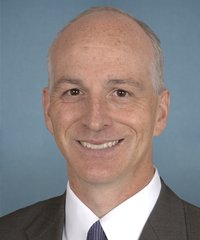
Adam Smith was born on June 15, 1965, in Washington, D.C. Adam was raised in SeaTac, Washington where his father, Ben, worked as a ramp serviceman at SeaTac Airport and was active in the local Machinists’ Union. His mother, Leila, stayed at home, raising Adam and his two brothers. Adam attended Bow Lake Elementary, Chinook Middle School, and Tyee High School, graduating from Tyee in 1983.
After a year at Western Washington University, Adam transferred to Fordham University, where he worked his way through college loading trucks for United Parcel Service and graduated in 1987 with a degree in Political Science. Following his graduation, Adam attended the University Of Washington School Of Law, and earned his law degree in 1990. He later worked in both private and public practice, first as a lawyer at Cromwell, Mendoza and Belur in 1992, and then as a prosecutor for the City of Seattle from 1993-1995. As a prosecutor, Adam focused on drunk driving and domestic violence cases, and in 1996, went on to work as a judge pro tempore.
It is critical that we set realistic goals to hold schools accountable for providing the education students deserve while taking into consideration the unique challenges that must be overcome in the classroom. Our education system must support and revitalize our public schools instead of labeling them as failing when they are not.
I am pleased that in December 2015, the House of Representatives passed a bipartisan reauthorization of the Elementary and Secondary Education Act (ESEA) that replaces the flawed policies of No Child Left Behind (NCLB). I voted for S. 1177, the Every Student Succeeds Act of 2015 (ESSA) because reauthorizing the ESEA was the most important action Congress could take to fix the flawed NCLB law.
NCLB placed unreasonable standards on students, teachers, and administrators, and led to award-winning schools being labeled as failing. The consequences of NCLB have been felt directly in Washington state where, since the 2014 loss of a U.S. Department of Education waiver, 88 percent of schools have been deemed to be failing under NCLB standards, even when that is clearly not the case. The new ESSA law ends the need for waivers for states and replaces the one-size-fits-all approach of NCLB’s federal accountability system by shifting authority for academic standards and school accountability back to states and local school districts.
The bipartisan ESSA conference agreement passed by the House included aspects that were important to our region, including federal dollars to support locally-tailored improvements in the highest-need schools. The bill also authorized the Student Support and Academic Enrichment grant program that allocates federal funds based on need, population, as well as school district identified opportunity gaps. These grants will support programs to keep students safe and healthy, promote well rounded education opportunities such as foreign language and STEM, and encourage the effective use of technology in schools. Further, this education legislation improves the Migrant Education Program to prioritize services for migrant students who have dropped out of school. ESSA is a much needed step towards promoting fair and equal access to quality public education.
Since it was first enacted in 1965, the ESEA has played a key role in providing equal access to quality public education and helping to reduce educational inequalities. Significant work still remains to ensure that all of our students, regardless of where they live, receive high-quality instruction, and I remain committed to working with my colleagues to support students throughout our country.
Access to higher education is also extremely important to the success of our children. Whether through grants or scholarships, making higher education affordable is critical for the future of millions of students. I strongly support Pell Grants and maintaining access to low interest rates on student loans.
Providing a quality education to students in our public schools has become even more important. With an unemployment rate around five percent, there are millions of jobs that can’t be filled because our workforce does not have the skills needed to fill them. It is critical that we prepare our children for the competitive global economy and make sure they have the skills that directly apply to the type of employment opportunities available when they enter the workforce.
I am a strong advocate of investing in our education system through sound and effective policies that ensure a quality education is equally available to all children.